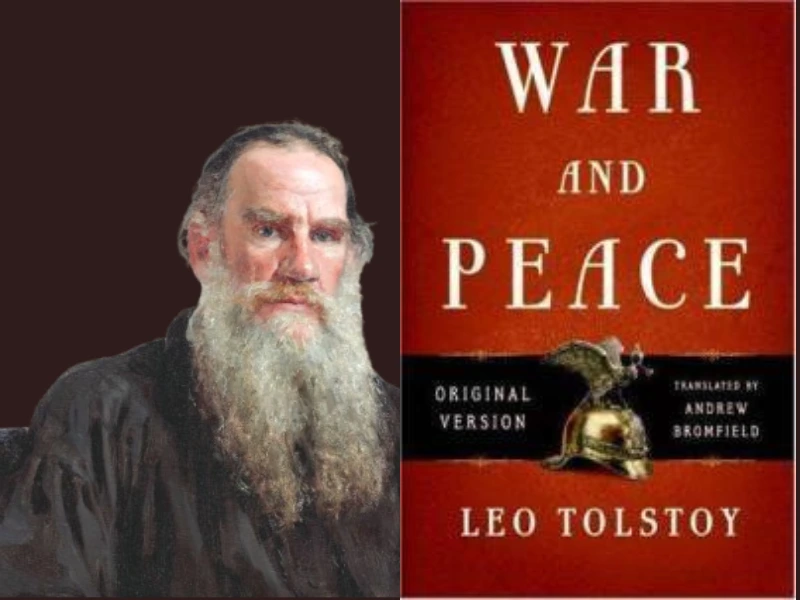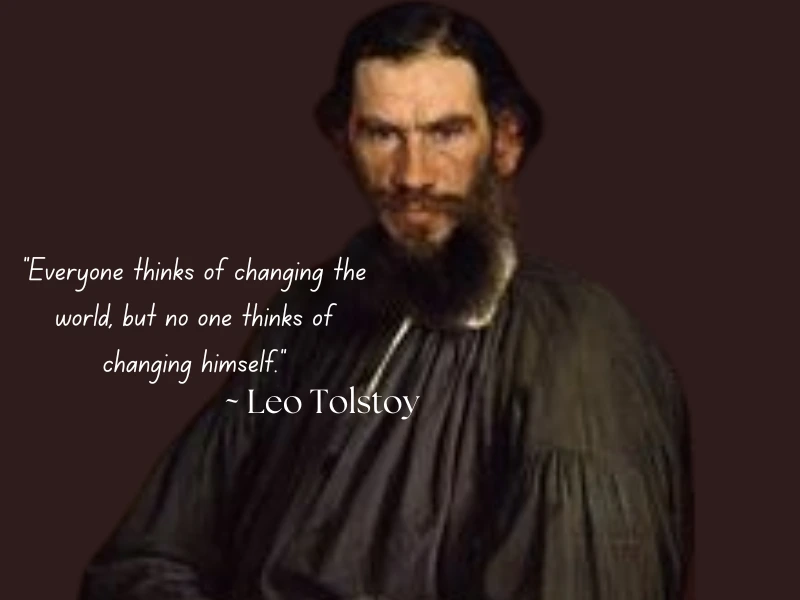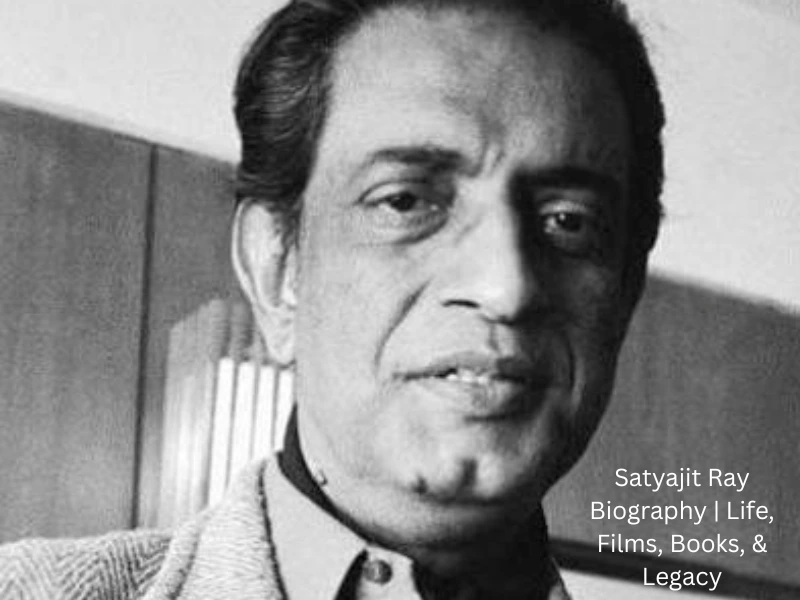Leo Tolstoy’s Stats: Key Facts and Figures
Basic Information
- Full Name: Count Lev Nikolayevich Tolstoy
- Date of Birth: September 9, 1828
- Place of Birth: Yasnaya Polyana, Tula, Russian Empire
- Date of Death: November 20, 1910
- Age at Death: 82 years
- Cause of Death: Pneumonia
- Nationality: Russian
- Education: Kazan University (1844–1847) – Studied Oriental languages and law but dropped out.
- Occupation: Writer, Philosopher, Social Reformer
- Language: Russian
- Genres: Fiction, Historical Fiction, Philosophy, Religion
Family and Personal Life
- Father: Count Nikolai Ilyich Tolstoy
- Mother: Princess Maria Volkonskaya Tolstaya
- Siblings: Four brothers and sisters
- Spouse: Sophia (Sonya) Tolstaya (married 1862)
- Children: 13 (including Ilya Tolstoy and Alexandra Tolstaya)
Major Literary Works and Publications
Novels:
- War and Peace (1869) – 587,287 words, 1,225 pages (English translation)
- Anna Karenina (1878) – 349,736 words, 864 pages (English translation)
- Resurrection (1899) – Critique of Russian society
- The Cossacks (1863) – Story of a Russian soldier in the Caucasus
Novellas & Short Stories:
- The Death of Ivan Ilyich (1886) – A powerful existential novella
- Hadji Murat (Published posthumously in 1912) – A war novel
- Family Happiness (1859) – A love and marriage story
Philosophical & Religious Works:
- A Confession (1882) – Tolstoy’s spiritual crisis and search for meaning
- The Kingdom of God Is Within You (1894) – Inspired Gandhi’s philosophy of nonviolence
- What Is Art? (1897) – Tolstoy’s views on the role of art in society
Leo Tolstoy’s Legacy in Numbers
- Total Published Works: Over 90 books and essays
- Words in War and Peace: Over 587,000 words
- Languages Translated Into: Over 70+ languages
Leo Tolstoy is a remarkable writer whose works are inseparable from world literature. He is best known for his novels “War and Peace” and “Anna Karenina,” the former two being epic long novels. A Russian novelist, philosopher, and social reformer, Tolstoy’s themes touched upon the subjects of morality, human nature, love, and the meaning of life. He inspired more readers through his writings. He stands among the greatest novelists in history.
This biography gives readers an exhaustively detailed account of Leo Tolstoy’s life, literary career, philosophical beliefs, and his legacy.
Early Life and Family Background
Birth and Childhood
Leo Tolstoy was born on September 9, 1828. He was at the Yasnaya Polyana estate in Tula, Russia. His full name was Count Lev Nikolayevich Tolstoy. He was from an aristocratic family that enjoyed strong military and political connections within Russia.
His mother, Princess Maria Volkonskaya, was taken from Tolstoy at the age of two. Nine years later, his father, Count Nikolai Ilyich Tolstoy, left his children in their care as well. His younger siblings and himself were placed into the hands of relatives for nurturing.
Education and Early Influences
Tolstoy studied at Kazan University, where he entered as an Orientalist but then became a lawyer. He, however, did not find formal education very satisfying and left without completing his degree. He developed interests in philosophy and literature; he devoured works by Jean-Jacques Rousseau, Charles Dickens, and the Bible. His early diaries were deep in self-examination and questing for moral perfection.
Tolstoy’s Military Service and First Writings
Enlistment in the Russian Army
In 1851, Tolstoy joined the Russian Army and was stationed in the Caucasus. His experiences in the army, particularly during the Crimean War (1853–1856), had a profound impact on his views on violence, war, and human suffering.
During his military service, he wrote “The Cossacks” (1863) and a series of semi-autobiographical stories, including:
- Childhood (1852)
- Boyhood (1854)
- Youth (1857)
These works established him as a rising literary talent in Russia.
Books by Leo Tolstoy: A Complete List of His Famous Works
Here is a detailed list of his most popular books, their summaries, and importance.
1. “War and Peace” (1869): A Masterpiece of Historical Fiction
Genre: Historical Fiction, Epic Novel
Tolstoy’s “War and Peace” is considered one of the greatest novels ever written. It blends historical events, personal drama, and philosophical reflections to portray Russia during the Napoleonic Wars (1805-1812).
Key Themes in “War and Peace”:
- The impact of war on society and individuals
- The role of fate and free will in history
- The complexity of human relationships
The novel’s grand scale, complex characters (like Pierre Bezukhov and Prince Andrei), and deep philosophical insights make it a timeless classic.
2. “Anna Karenina” (1878): A Tragic Love Story
Genre: Realist fiction, Tragedy.
Summary: Anna Karenina tells the tragic love story of Anna, a high-society woman who has an affair with Count Vronsky, leading to social exile and personal destruction. It also contrasts her fate with the happier life of Levin, a character representing Tolstoy’s own ideals.
Key Themes in “Anna Karenina”:
- The contrast between passion and duty
- The struggles of women in Russian society
- Moral and existential dilemmas
The novel’s iconic opening line, “All happy families are alike; each unhappy family is unhappy in its own way,” remains one of the most famous in literary history.
3. The Death of Ivan Ilyich (1886)
- Genre: Novel, Psychological Fiction
- Summary: Ivan Ilyich is a successful judge who, after falling terminally ill, reflects on the meaningless nature of his materialistic life. Facing death, he realizes he has never truly lived.
- Why It’s Famous: A powerful philosophical work that questions life, death, and the search for meaning.
4. Resurrection (1899)
- Genre: Social and Political Novel
- Summary: The novel follows Prince Dmitri, who tries to redeem himself after ruining the life of Katyusha, a young servant he seduced and abandoned. When he sees her in court years later, falsely accused of a crime, he attempts to save her.
- Why It’s Famous: A scathing critique of the Russian legal system and social inequality, influenced by Tolstoy’s later spiritual beliefs.
5. A Confession (1882)
- Genre: Autobiographical, Philosophy
- Summary: Tolstoy describes his spiritual crisis and search for the meaning of life, questioning religion, society, and personal faith.
- Why It’s Famous: A deeply personal and philosophical book that reflects Tolstoy’s shift towards pacifism, nonviolence, and simple living.
6. The Cossacks (1863)
- Genre: Adventure, Historical Fiction
- Summary: A young Russian nobleman, Dmitri Olenin, joins the Russian army in the Caucasus and falls in love with a Cossack girl, Marianka. However, his attempts to adopt their way of life end in failure.
- Why It’s Famous: Showcases Tolstoy’s early fascination with rural life, honor, and war.
7. Hadji Murat (Published Posthumously in 1912)
- Genre: Historical Fiction, War Novel
- Summary: Based on a real-life figure, Hadji Murat is a Chechen warrior caught between loyalty to his people and service to the Russian Empire.
- Why It’s Famous: One of Tolstoy’s best war novels, offering a balanced and humanistic view of both sides in the Caucasian War.
8. Family Happiness (1859)
- Genre: Romance, Psychological Fiction
- Summary: The novel explores the marriage of a young woman, Masha, and her older husband, Sergei, as their love changes over time.
- Why It’s Famous: A subtle and emotional portrayal of love, disillusionment, and personal growth.
9. What Is Art? (1897)
- Genre: Literary Criticism, Philosophy
- Summary: Tolstoy critiques the elitism of art and argues that true art should be accessible to all and inspire moral good.
- Why It’s Famous: Controversial for rejecting works by Shakespeare and Beethoven, but influential in defining the purpose of art.
10. The Kingdom of God Is Within You (1894)
- Genre: Christian Philosophy, Political Writing
- Summary: A religious and philosophical work advocating nonviolence, Christian anarchism, and pacifism.
- Why It’s Famous: Inspired Mahatma Gandhi and later peace movements worldwide.
Other Notable Works
- Childhood, Boyhood, and Youth (1852-1856): A semi-autobiographical trilogy about Tolstoy’s early years.
- Sevastopol Sketches (1855-1856): A collection of short stories based on Tolstoy’s experiences in the Crimean War.
- Walk in the Light and Twenty-Three Tales (1902): A collection of moral and religious stories.
Tolstoy’s later writings focused on simplicity, non-violence, and Christian ethics, influencing figures like Mahatma Gandhi and Martin Luther King Jr.
Famous Short Stories by Leo Tolstoy
Leo Tolstoy wrote several powerful short stories that explore morality, human nature, greed, and spirituality. Here are some of his most famous short stories:
- “How Much Land Does a Man Need?” (1886) – A parable about a greedy man who keeps trying to acquire more land, only to die, proving that in the end, a man only needs enough land for his grave.
- “God Sees the Truth, But Waits” (1872) – The story of a man wrongly imprisoned for a crime he didn’t commit, teaching a lesson about forgiveness and fate.
- “What Men Live By” (1885) – A story about an angel sent to earth to learn what truly sustains human life—love and kindness.
- “The Three Questions” (1903) – A thought-provoking tale where a king seeks the answers to the most important questions in life, ultimately discovering that the best time is “now,” the most important person is “who you are with,” and the right thing to do is “to do good.”

Leo Tolstoy’s Poems and Poetry Style
Although Leo Tolstoy is best known for his novels and philosophical works, he also wrote poetry, though not as extensively as other Russian literary figures. His poems often reflected his spiritual beliefs, moral values, and deep reflections on life, death, and humanity.
“A Prayer“: A deeply spiritual poem where Tolstoy reflects on faith, humility, and seeking guidance from God.
O Lord, help me to live this day,
With kindness in my heart and truth in my way.
Let me not seek wealth nor pride,
But in Your love and grace abide.
Teach me patience, teach me peace,
Let all my selfish cravings cease.
May I serve, may I forgive,
And in Your wisdom, truly live.
Guide my hands to help the weak,
And give a voice to those who seek.
Let my words be soft and pure,
So love and mercy may endure.
O Lord, if trials come my way,
Give me strength, let me not stray.
With faith in You, my path is bright,
For in Your love, there is no night.
“Love Each Other“: A short but powerful poem about the importance of love, kindness, and human connection.
Love each other, this is life,
An end to sorrow, an end to strife.
Not in riches, not in might,
But in love does the soul burn bright.
A gentle word, a helping hand,
The smallest kindness makes life grand.
For wealth will fade, and power will fall,
But love and mercy conquer all.
No man is high, no man is low,
Before the grave, all people go.
Yet love remains, both strong and true,
A light that shines in all we do.
So love each other while you live,
For love alone has power to give.
Not in anger, not in pride,
But in love, let hearts abide.
Tolstoy’s Poetry Themes
- Faith and Spiritual Awakening
- Love, Compassion, and Humanity
- The Meaning of Life and Death
- Criticism of Materialism and Social Inequality
Also read Marga Minco Biography
Tolstoy’s Philosophical and Religious Beliefs
In the 1880s, Tolstoy rejected his aristocratic privileges, wealth, and Russian Orthodox Christianity. He developed a philosophy based on:
- Pacifism and non-violence: He believed in “turning the other cheek” and condemned war.
- Simplicity and Self-Sufficiency: He gave up his lavish lifestyle and encouraged manual labor.
- Criticism of Organized Religion: He rejected the Russian Orthodox Church and was later excommunicated in 1901.
- Advocacy for Peasant Rights: He promoted equality and social justice.
His ideas inspired Tolstoyan communities and had a lasting influence on Gandhi’s philosophy of non-violent resistance.
Leo Tolstoy Quotes: Wisdom, Life, Love, and Philosophy
Quotes on Life and Its Meaning
“Everyone thinks of changing the world, but no one thinks of changing himself.”
“There is no greatness where there is no simplicity, goodness, and truth.”
“Life is a dream, and death is the awakening.”
Quotes on Love and Relationships
“There are as many kinds of love as there are hearts.”
“All, everything that I understand, I understand only because I love.”
“It is not beauty that endears; it’s love that makes us see beauty.”
Quotes on Truth and Wisdom
“There is only one enduring happiness in life—to live for others.”
“Faith is the sense of life, that sense by virtue of which man does not destroy himself but continues to live on.”
Quotes from “War and Peace”
“There is no greatness where there is no simplicity, goodness, and truth.”
“The only thing that we know is that we know nothing—and that is the highest flight of human wisdom.”
“Nothing is so necessary for a young man as the company of intelligent women.”
Leo Tolstoy’s Philosophy
Leo Tolstoy’s philosophy focused on simplicity, morality, and nonviolence. After the intense spiritual crisis, he quit his aristocratic lifestyle and tried to lead a life of faith, peace, and service for others.
- Simplicity & Abandoning Riches: He believed that a simple life with no materialism and wastefulness can lead to a person’s ultimate happiness. He wore peasant-like clothing, tended his farm, and renounced all his wealth.
- Nonviolence & Pacifism: He was an opponent of war, violence, and government control, believing that peace and love should guide human actions. His ideas influenced Mahatma Gandhi and Martin Luther King Jr.
- Faith Over Religion: He rejected the Russian Orthodox Church as corrupt. He adopted a personal form of Christianity based on love, compassion, and forgiveness.
- Moral Living & Truth: Tolstoy promoted honesty, self-control, and to help others. He believed the art and literature are created to raise human beings towards goodness, social change.
Personal Life and Family
Marriage to Sophia Tolstaya
In 1862, Tolstoy married Sophia (Sonya) Tolstaya, who played a crucial role in his life. She managed his household, edited his manuscripts, and bore him 13 children.
However, their marriage was strained in later years due to Tolstoy’s spiritual transformation and desire to give away his wealth.
Death and Legacy
Final Years and Death
In 1910, Tolstoy left his home in Yasnaya Polyana at the age of 82, looking for a simple life in solitude. He died of pneumonia on November 20, 1910, at the Astapovo train station. He was buried without a religious ceremony in his family estate, as he had wished.
Tolstoy’s Enduring Influence
- His works remain widely read and studied worldwide.
- He influenced modern literature, philosophy, and political movements.
- His ideas on pacifism and social justice shaped figures like Mahatma Gandhi and Martin Luther King Jr.
Tolstoy’s legacy as a literary genius, philosopher, and humanitarian continues to inspire generations.
Conclusion: The Timeless Genius of Leo Tolstoy
Leo Tolstoy was not only a novelist; he was a thinker, a reformer, and a visionary. His works reveal human emotions, morality, and the quest for meaning. From the battlefields in “War and Peace” to the tragic love of “Anna Karenina,” his stories remain profound and relevant. Tolstoy’s belief in the simple things, peace, and literature power has endeared him to be one of the greatest writers in history. His life reminded us that literature is not only about storytelling, but also about understanding life itself.
FAQs
What was Tolstoy famous for?
Leo Tolstoy was famous for writing War and Peace and Anna Karenina, two of the greatest novels in world literature. He was also known for his philosophy of nonviolence, simple living, and spiritual teachings, which influenced leaders like Mahatma Gandhi.
Did Tolstoy write to Gandhi?
Yes, Tolstoy and Gandhi exchanged letters in 1909, discussing nonviolence, truth, and resistance to oppression. Tolstoy’s book The Kingdom of God Is Within You deeply influenced Gandhi’s Satyagraha movement.
What is a famous quote by Leo Tolstoy?
“Everyone thinks of changing the world, but no one thinks of changing himself.”
In which language did Tolstoy write?
Tolstoy wrote primarily in Russian. His works have been translated into over 70 languages worldwide.
Did Tolstoy get a Nobel Prize?
Tolstoy was nominated for the Nobel Prize in Literature multiple times (from 1902 to 1906), but he never won.




I just couldn’t depart your site prior to suggesting that I actually loved the usual info a person supply for your visitors? Is going to be again regularly to check up on new posts
This is a topic close to my heart cheers, where are your contact details though?
Wow! Thank you! I continuously needed to write on my website something like that. Can I include a part of your post to my blog?